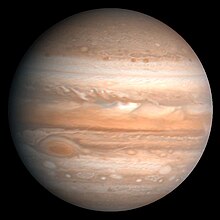बृहस्पति ग्रह
स्वरूप
 | |||||||||||||||||||||||
| विवरण | |||||||||||||||||||||||
|---|---|---|---|---|---|---|---|---|---|---|---|---|---|---|---|---|---|---|---|---|---|---|---|
| विशेषण | Jovian | ||||||||||||||||||||||
| कक्षपथको विशेषताहरू[४][५] | |||||||||||||||||||||||
| युग J2000 | |||||||||||||||||||||||
| अपसूर | ८१,६५,२०,८०० किमी (५.४५८१०४ AU) | ||||||||||||||||||||||
| अनुसूर | ७४,०५,७३,६०० किमी (४.९५०४२९ AU) | ||||||||||||||||||||||
| अर्ध-मुख्य अक्ष | ७७,८५,४७,२०० किमी (५.२०४२६७ AU) | ||||||||||||||||||||||
| विलक्षणता | 0.048775 | ||||||||||||||||||||||
| कक्षीय अवधि | 4,331.572 days 11.85920 yr 10,475.8 Jupiter solar days[१] | ||||||||||||||||||||||
| युटिकाला | 398.88 days[२] | ||||||||||||||||||||||
| औसत कक्षीय गति | 13.07 km/s[२] | ||||||||||||||||||||||
| औसत गति | 18.818° | ||||||||||||||||||||||
| झुकाव | 1.305° to Ecliptic 6.09° to Sun's equator 0.32° to Invariable plane[३] | ||||||||||||||||||||||
| उदविन्दुरको देशान्तर | 100.492° | ||||||||||||||||||||||
| अनुसूरको सिद्धान्त | 275.066° | ||||||||||||||||||||||
| उपग्रहहरू | ६७ | ||||||||||||||||||||||
| भौतिक विशेषताहरू | |||||||||||||||||||||||
| औसत व्यास | 69,911 ± 6 km[६][७] | ||||||||||||||||||||||
| भूमध्यरेखीय अर्धव्यास | 71,492 ± 4 km[६][७] 11.209 Earths | ||||||||||||||||||||||
| ध्रुव अर्धव्यास | 66,854 ± 10 km[६][७] 10.517 Earths | ||||||||||||||||||||||
| समरुपताको | 0.06487 ± 0.00015 | ||||||||||||||||||||||
| सतहको क्षेत्रफल | 6.21796×1010 km2[७][८] 121.9 Earths | ||||||||||||||||||||||
| आयतन | 1.43128×1015 km3[२][७] 1321.3 Earths | ||||||||||||||||||||||
| द्रव्यमान | 1.8986×1027 kg[२] 317.8 Earths 1/1047 Sun[९] | ||||||||||||||||||||||
| औसत घनत्व | 1.326 g/cm3[२][७] | ||||||||||||||||||||||
| भूमध्यरेखीय सतहको गुरुत्वाकर्षण | 24.79 m/s2[२][७] 2.528 g | ||||||||||||||||||||||
| रिहाइ वेग | 59.5 km/s[२][७] | ||||||||||||||||||||||
| नाक्षचित्र घृर्णनकाल | 9.925 h[१०] (9 h 55 m 30 s) | ||||||||||||||||||||||
| भूमध्यरेखीय आञ्चलिक घृर्णन वेग | 12.6 km/s 45,300 km/h | ||||||||||||||||||||||
| अक्षीय ढाल | 3.13°[२] | ||||||||||||||||||||||
| उत्तर ध्रुवीय विषुबलम्ब | 268.057° 17 h 52 min 14 s[६] | ||||||||||||||||||||||
| उत्तर ध्रुवीय विषुबलम्ब | 64.496°[६] | ||||||||||||||||||||||
| प्रतिफलन अनुपात | 0.343 (Bond) 0.52 (geom.)[२] | ||||||||||||||||||||||
| |||||||||||||||||||||||
| आपात मान | -1.6 to -2.94[२] | ||||||||||||||||||||||
| कौणिक व्यास | 29.8" — 50.1"[२] | ||||||||||||||||||||||
| वायुमण्डल[२] | |||||||||||||||||||||||
| सतहको चाप | 20–200 kPa[११] (cloud layer) | ||||||||||||||||||||||
| स्केल उच्चता | 27 km | ||||||||||||||||||||||
| गठन |
| ||||||||||||||||||||||

बृहस्पति ग्रह सौर्यमण्डलको सबैभन्दा ठूलो र सूर्यबाट पाँचौं ग्रह हो। ग्याँसबाट मात्रै बनेकोले, त्यसलाई ग्याँस पिण्ड भन्छन्। सौर्यमण्डलको अरु सात ग्रहको पिण्ड जम्म गरेपनि, बृहस्पति ग्रहको पिण्ड झन बढी हुन्थ्यो।
सन् २००३ मा बृहस्पतिको वरिपरि घुमिरहेको ६३वटा चन्द्रमा पत्ता लगाइसकेको थिए। त्यीमाध्य सबभन्दा ठूलो ४ वटा चन्द्र वैज्ञानिक ग्यालिलेयोले पत्ता लागेकोले, गालिलेयी चन्द्रमा भन्छन्। तिनीका नाम आयो, युरोपा, ग्यानिमिड र कलिस्टो हुन्।
बृहस्पति ग्रह ठूलो भएर त्यसको वायु-मण्डल गहिरो गएर उच्च चाप हुन्छ। अन्तरिक्षयान बृहस्पतिभित्र पस्यो भने, एक छिनमै किचिन्थ्यो। त्यसकारणले बृहस्पतिको वायु-मण्डलभित्र के के छ भनेर थोरै थाहा छ।
बृहस्पतिको पतलो चक्र छ।
थप जानकारीका लागि हेर्नुहोस्
[सम्पादन गर्नुहोस्]सन्दर्भ
[सम्पादन गर्नुहोस्]- ↑ Seligman, Courtney, "Rotation Period and Day Length", अन्तिम पहुँच २००९-०८-१३।
- ↑ २.०० २.०१ २.०२ २.०३ २.०४ २.०५ २.०६ २.०७ २.०८ २.०९ २.१० २.११ २.१२ २.१३ उद्दरण त्रुटी: Invalid
<ref>tag; no text was provided for refs namedfact - ↑ "The MeanPlane (Invariable plane) of the Solar System passing through the barycenter", २००९-०४-०३, मूलबाट २००९-०४-२०-मा सङ्ग्रहित, अन्तिम पहुँच २००९-०४-१०। (produced with Solex 10 written by Aldo Vitagliano; see also Invariable plane)
- ↑ Yeomans, Donald K. (२००६-०७-१३), "HORIZONS System", NASA JPL, अन्तिम पहुँच २००७-०८-०८। — At the site, go to the "web interface" then select "Ephemeris Type: Elements", "Target Body: Jupiter Barycenter" and "Center: Sun".
- ↑ Orbital elements refer to the barycenter of the Jupiter system, and are the instantaneous osculating values at the precise J2000 epoch. Barycenter quantities are given because, in contrast to the planetary centre, they do not experience appreciable changes on a day-to-day basis from to the motion of the moons.
- ↑ ६.० ६.१ ६.२ ६.३ ६.४ Seidelmann, P. Kenneth; Archinal, B. A.; A’Hearn, M. F.; et al. (२००७), "Report of the IAU/IAGWorking Group on cartographic coordinates and rotational elements: 2006", Celestial Mechanics and Dynamical Astronomy 90 (3): 155–180, डिओआई:10.1007/s10569-007-9072-y, अन्तिम पहुँच २००७-०८-२८।
|coauthors=प्यारामिटर ग्रहण गरेन (सहायता) - ↑ ७.० ७.१ ७.२ ७.३ ७.४ ७.५ ७.६ ७.७ Refers to the level of 1 bar atmospheric pressure
- ↑ "Solar System Exploration: Jupiter: Facts & Figures", NASA, ७ मे २००८।
- ↑ "Astrodynamic Constants", JPL Solar System Dynamics, २००९-०२-२७, अन्तिम पहुँच २००७-०८-०८।
- ↑ Seidelmann, P. K.; Abalakin, V. K.; Bursa, M.; Davies, M. E.; de Burgh, C.; Lieske, J. H.; Oberst, J.; Simon, J. L.; Standish, E. M.; Stooke, P.; Thomas, P. C. (२००१), "Report of the IAU/IAG Working Group on Cartographic Coordinates and Rotational Elements of the Planets and Satellites: 2000", HNSKY Planetarium Program, अन्तिम पहुँच २००७-०२-०२। वेब्याक मेसिन अभिलेखिकरण २०१८-१०-३१ मिति
- ↑ Anonymous (March १९८३), "Probe Nephelometer", Galileo Messenger (NASA/JPL) (6), अन्तिम पहुँच २००७-०२-१२।
|month=प्यारामिटर ग्रहण गरेन (सहायता)
विकिमिडिया कमन्समा बृहस्पति ग्रह सम्बन्धी अन्य सामग्रीहरू रहेका छन्।

